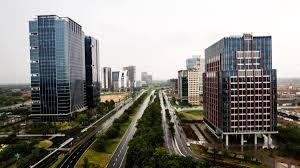The Rise of Smart City Projects in India
India’s smart city initiative aims to modernize urban centers. Government policies support technological integration, efficient resource management, and eco-friendly infrastructure.
Cities focus on intelligent transportation, energy management, and digital governance. Smart city projects attract investors and boost economic activity. Moreover, they create employment opportunities while improving citizens’ daily lives.
Sustainable Urban Planning and Green Infrastructure
A key feature of smart city developments is sustainability. Green infrastructure, such as solar-powered streetlights and energy-efficient buildings, reduces carbon footprints.
Urban planners prioritize parks, green belts, and water recycling systems. These initiatives improve air quality and overall well-being.
In addition, cities promote waste segregation and smart water management to ensure environmental balance.
Digital Connectivity and Smart Governance
Smart city developments emphasize digital connectivity and e-governance. High-speed internet, IoT-enabled sensors, and mobile applications enhance citizen services.
Residents can access real-time traffic updates, pay bills online, or report civic issues efficiently.
This approach increases transparency, reduces bureaucratic delays, and strengthens urban management. Furthermore, public safety improves through smart surveillance systems and emergency response networks.
Intelligent Transportation Systems and Mobility Solutions
Transportation plays a crucial role in smart city planning. Iconic smart city developments incorporate intelligent traffic management systems, electric buses, and metro networks.
Smart parking solutions and app-based ride-sharing reduce congestion. Cities also invest in pedestrian-friendly infrastructure and bicycle lanes.
These solutions save time, reduce pollution, and enhance urban mobility for residents.
Smart Energy and Utility Management
Energy efficiency is central to modern urban development. Smart city projects implement automated energy grids, renewable energy integration, and efficient street lighting.
Water supply and sewage systems are monitored digitally to minimize wastage. Smart meters allow residents to track consumption and reduce bills. Such utility management ensures cost savings while promoting sustainable living.
Innovative Housing and Mixed-Use Developments
Modern urban planning combines residential, commercial, and recreational spaces. Iconic smart city developments emphasize mixed-use layouts to reduce commuting time.
Affordable housing, modern apartments, and integrated shopping hubs provide convenience. Urban landscapes also include cultural and recreational centers, enhancing community living. This approach balances economic growth with lifestyle needs.
Health, Education, and Social Infrastructure
Smart city developments prioritize access to essential services. Hospitals and clinics use telemedicine and digital records for faster healthcare.
Schools and colleges integrate smart classrooms and e-learning facilities. Public libraries, community centers, and sports complexes enhance social engagement.
Residents benefit from improved services that foster knowledge, health, and well-being.
Economic Growth and Investment Opportunities
Smart cities attract businesses and investors. IT parks, co-working hubs, and innovation centers create a thriving economic environment.
Improved infrastructure and connectivity enhance business efficiency. Entrepreneurs find opportunities for start-ups, while large companies expand operations.
Consequently, these developments generate employment, stimulate local economies, and boost urban competitiveness.
Challenges and the Road Ahead
Despite rapid progress, challenges remain. Funding constraints, coordination issues, and technological adaptation can slow development.
Citizen awareness and engagement are critical for long-term success. Future smart city projects focus on inclusivity, climate resilience, and digital literacy.
By addressing these challenges, India can maximize the impact of its smart city initiatives.
Conclusion: India’s Urban Future
Iconic smart city developments are transforming India’s urban landscape. They integrate technology, sustainability, and innovation to create efficient, livable cities.
Residents enjoy better connectivity, modern infrastructure, and enhanced quality of life. As India continues investing in smart urban solutions, cities will become more sustainable, inclusive, and economically vibrant.
Call to Action: Stay informed about India’s smart city projects and explore opportunities to contribute to a sustainable urban future.
FAQ: Iconic Smart City Developments in India
Q1: What defines a smart city in India?
A smart city uses technology, sustainable infrastructure, and efficient governance to improve urban living.
Q2: How do smart city developments benefit citizens?
They offer better connectivity, improved utilities, sustainable housing, and enhanced social services.
Q3: Are all smart cities in India fully developed?
No, most cities are in different development stages, with ongoing infrastructure and technology upgrades.
Q4: Can smart cities support economic growth?
Yes, they attract businesses, create jobs, and foster innovation hubs for entrepreneurs.
Q5: How is sustainability integrated into smart city planning?
Through green buildings, renewable energy, water management, waste reduction, and eco-friendly urban design.

